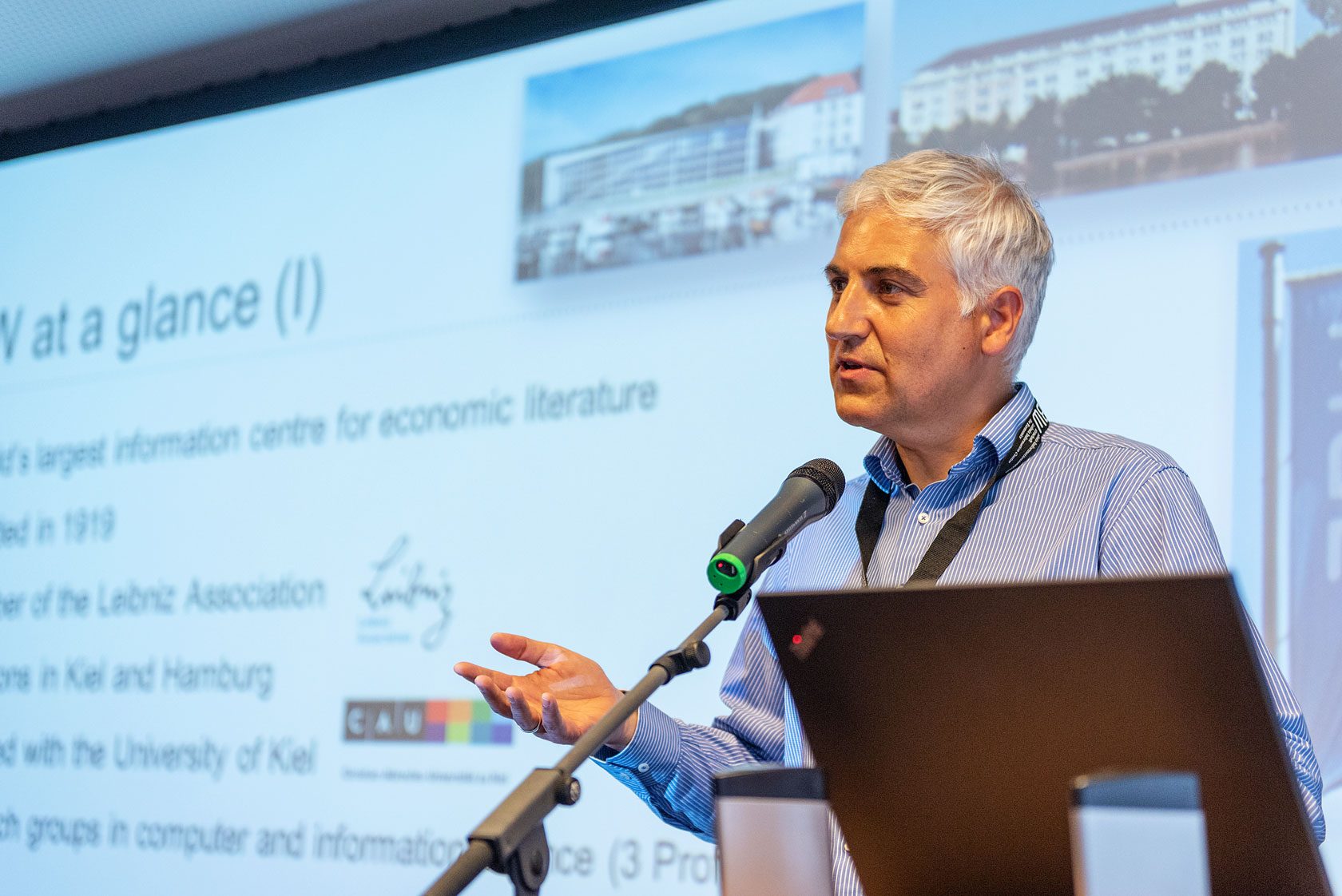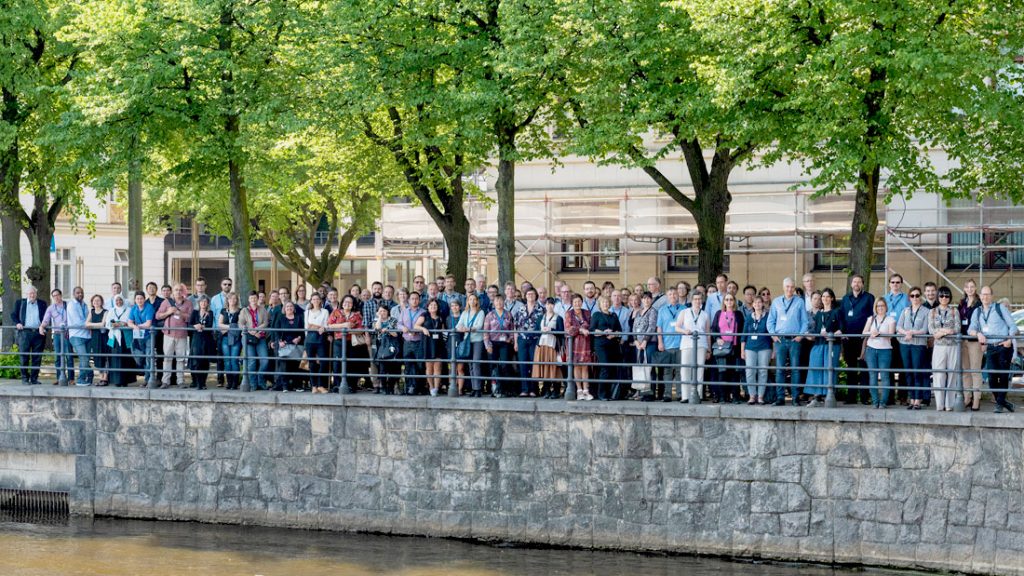
COAR Annual Meeting 2018: Repositories as Central Infrastructure of Open Scholarly Communication
From 14 - 17 May 2018 the 7th Annual Meeting of the Confederation of Open Access Repositories (COAR) was held at the ZBW in Hamburg. The meeting in Hamburg was attended by 108 participants from 30 nations on all major continents, making it the largest and most international meeting of the network to date. In total, there were around 50 individual lectures and a separate poster session.
by Olaf Siegert
Behind the COAR lies a global network of now over 130 institutions (libraries, data centres, research funding organisations and ministries). The aims of the COAR are the further development of repositories and the positioning of these in an open scientific landscape. The focus of the meeting was the discussion surrounding COAR’s proposals for “Next Generation Repositories”, the use of repositories for other content than publications (e.g. research data or teaching materials), and various national reports on the subjects of open access and open science.
Next generation repositories
The annual meeting was framed by two keynote presentations: In the first, “Open Science and the Role of Repositories” ZBW Director Klaus Tochtermann placed the “Next Generation Repositories” in the context of other reports and recommendations in the field of open science. In particular, he discussed the European Open Science Cloud and the GO FAIR initiative. His argument was as follows: the various initiatives within open science should relate more closely to and learn from one another – they would then achieve greater effectiveness in implementing open scholarly communication.
In the closing keynote presentation, “Unleashing Knowledge with Open Access”, Jean-Claude Goudon (University of Montreal) developed central aspects of the role of repositories. In his lecture of the sociology of science, he emphasised in particular the relevance to the workflows of researchers, and the appropriateness of comprehensive and open (and non-commercial!) scholarly communication.
Services related to research data and repositories
Before the COAR meeting itself had even begun, two networked technical workshops were held on 14 and 15 May. On the one hand, these were about the subject of alternative impact measurement using social networks. For this purpose, the DFG project *metrics, in which the ZBW is involved, organised an event format that not only included traditional lectures, but also interactive formats. Two of the various lectures are mentioned here by way of example:
in “Standardised usage statistics from repositories (IRUS)”, Ross McIntyre described the very advanced activities being conducted in this field in the UK. Particularly impressive were both the scope of services for repositories (including many visualisations of the raw data collected) as well as the internationalisation efforts, including pilot installations in both the USA and Australia. The lecture on “Quality challenges of altmetric data aggregators” from Zohreh Zahedi (CWTS Leiden) in turn provided a very concise and clearly structured overview of the implementation status of altmetrics usage measurements, including the relevant tools, together with their advantages and disadvantages.
The second pre-conference workshop “Meeting of Repository Networks” was predominantly concerned with repository-based aggregator services. This focussed – amongst other topics – on recent developments of BASE, OpenAire and CORE, but also the efforts to set up national aggregators in Canada and Japan.
Two further workshops were held on the morning of 16 May. The emphasis was on Research data management in one workshop, while the other focussed on Metadata for repositories. The session on research data management was particularly impressive thanks to the energetic presentation of Marta Teperek (Delft University of Technology) on the subject of “Researcher engagement”, in which she examined various models for networking with researchers from an infrastructure perspective. In the process, she explained – amongst other topics – the ‘data stewards’ model used by her own university, in which discipline-specific experts advise the respective scientists on the subject of research data management.
International comparison of the state of open science and open access
In two sessions of the conference, known as “regional updates”, a total of 11 short presentations were held on the status of open access and open science in various countries around the world. At this point, we would like to mention two in particular:
Martin Borchert (University of New South Wales, Sydney) reported on “The Australasian repository scene”. He emphasised the importance of science policy for development in Australia, which was initiated and financed at an early stage by means of a national strategy for research infrastructure. In the first stage, this involved setting up publication repositories; however now research data repositories (particularly within the framework of the Australian National Data Service, ANDS) and their networking play at least as important a role. In addition, the system as a whole is being subjected to a major review in 2018.
The presentation “From Open Repository to Open Scholarly Communication: Experiences Learned in China (CAS)” by Zhang Zhixiong (National Science Library, Chinese Academy of Science) likewise turned out very interesting. He reported that since 2006, over 110 institutional repositories have been established in China, with 600,000 OA full texts, which can be researched amongst other options via a common search portal. In addition, a Chinese version of the repository software DSpace has been developed (called CSpace), which is now available in version 6.0. Furthermore, Zhang emphasised the flourishing of a preprint culture, including outside the traditional preprint disciplines of physics and economics (e.g. in biology with BioRxiv). This softens the traditional journal focus on scholarly communication. Overall, there is therefore still a great deal of development potential for repositories, provided that the proposal is followed: “The OA repository should not be a warehouse for data, but a stage for scientists!”
International networking boosts open science and open access
Overall, the COAR Annual Meeting offered a wide range of options for learning about the global developments relating to repositories, open access and open science. It was also a great opportunity to meet experts from around the world and exchange ideas with them about specialist subjects. There are links to all the presentations in the conference programme, a first report on the conference can likewise be found on the COAR websites, while visual impressions can be viewed on Flickr in an extensive image gallery.

Photos: COAR e.V.&cop<; on: Flickr
View Comments

Artificial Intelligence: New Opportunities for Citizen Science, Research and Libraries
Artificial intelligence offers great potential for open science and libraries. A...



